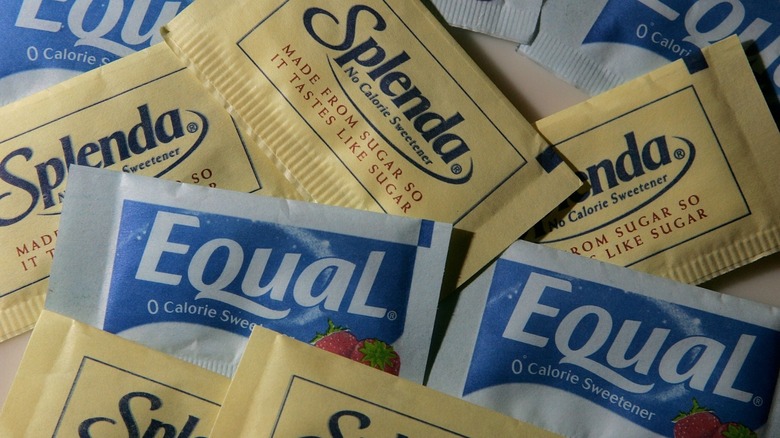Artificial Sweeteners Have Scary Health Risks, New Study Reveals
Artificial sweeteners are in a lot of the foods and beverages we eat and drink, especially for those who consume things labeled as "sugar-free" or "diet." You'll find fake sugar alternatives in Diet Coke, Splenda, sugar-free gum, and protein bars, to name a few. The FDA approves six types of artificial sweeteners, the best known of which are likely aspartame and sucralose. Many people turn to these substitutes as a way to get the sweetness of sugar without the calories. According to an article by the FDA, artificial sweeteners are up to 700 times sweeter than real sugar and contain zero calories, compared to the 16 calories in 1 teaspoon of sugar.
A 2020 survey in the Journal of the Academy of Nutrition and Dietetics found that more and more Americans have been consuming foods with artificial sweeteners in the last two decades. However, there may be negative health effects associated with eating or drinking what the FDA calls high-intensity sweeteners. A recent study revealed a startling risk of putting artificial sweeteners in your body. Here's what you need to know.
There may be a link between artificial sweeteners and cancer
You may have heard the rumor that artificial sweeteners — like Splenda, Equal, Sweet 'n Low, and the like — can cause cancer. However, the American Cancer Society explains that study results about potential connections between aspartame and cancer long have been inconsistent. While there have been studies done on rats, none have been conclusive or thorough on humans — until now. A recent study published in the PLOS Medicine journal has found evidence that there may be an association between the consumption of artificial sweeteners and the development of cancer.
From 2009 to 2021, researchers in France studied more than 100,000 adults and their intake of artificial sweeteners. They reported that, based on the results, artificial sweeteners may lead to an increased risk of cancer, specifically breast and obesity-related cancers. People who consumed any type of "high-intensity sweetener" had up to a 14% greater chance of developing cancer.
However, the FDA has yet to change its stance on artificial sweeteners. On its website, the agency maintains that consuming the sugar alternatives is safe. Additionally, the FDA says that the National Toxicology Program of the National Institutes of Health removed the artificial sweetener saccharin from its list of carcinogens in 2000. It has yet to make a statement on the new study.

